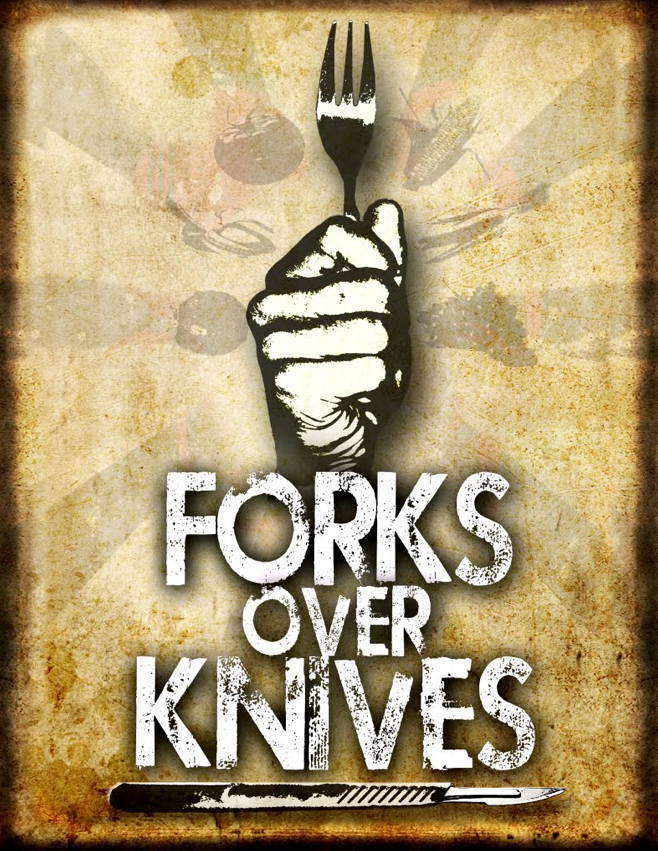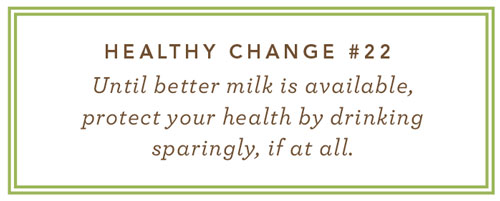
The Quick Answer: Americans enjoy their meat—to excess. To live longer and suffer less disease: 1) eat meat sparingly, 2) buy healthier meats, 3) cook meat at lower temperatures, and 4) combine it with more vegetables, fruits, and whole grains.
_________________________________________________________________________________________________
The picture above is for a new food documentary you should see: Forks Over Knives. If you study the image, you’ll see the knife isn’t for cutting your steak—it’s a surgeon’s scalpel designed to cut you! There are 500,000 heart bypass operations annually in the U.S. It’s a terribly invasive procedure that leaves one scarred. The best way to reduce your risk of bypass surgery—and premature death—is to eat better, including less meat.
The fork and scalpel are symbols of an important message: what you eat will protect your life better than surgery, or other medical interventions. The movie is not anti-doctor, in fact it portrays doctors in their most noble role—teaching people how to live and be well. Take Dr. Caldwell Esselstyn, a cardiologist in his late ‘70s with boyish good looks, and author of How to Prevent and Reverse Heart Disease. Esselstyn practiced at a prestigious hospital, the Cleveland Clinic, but challenged conventional treatment by starting an experiment of treating heart patients with nutrition and exercise rather than surgery. This happened over twenty years ago and Esselstyn’s lifestyle intervention was so successful many of his patients, once at death’s door, are still alive. Dr. T. Colin Campbell, author of The China Study, was also featured. These men espouse a vegan lifestyle though they prefer ot call it a "whole food, plant-based" diet.
Yesterday was Memorial Day. I spent the morning trying to write this post, making little progress. After lunch I went down to the beach to visit with friends and soak up some rays. There was a big crowd and everyone seemed healthy and happy. Later the beautiful wife and I went to see Forks Over Knives. The movie was a reminder of the terrible toll the standard American diet (SAD) takes on our health and it made me wonder if I’m being too calm and rational in writing these posts. Is more passion needed? The movie was shown at the theatre by the UC Irvine campus and afterwards we had dinner at a vegetarian café. I had chili and the kale salad; my wife’s salad had a tropical fruit relish. At the next table were two coeds who, it turned out, were on the board of directors of the Real Food club, a sustainable food movement on campus. We visited; after the movie, the vegetarian cafe seemed a safe place. One problem: I like meat.
Driving home I thought about my favorite meats: salmon, meat loaf with baked potato, the traditional Sunday roast, Thanksgiving turkey, pork chops with homemade applesauce, the occasional BLT sandwich. It was wonderful. This morning when I awoke, I knew what points to make in this post.
Point #1: I admire the doctors who spoke in the movie, but I doubt the vegetarian lifestyle will ever become mainstream in America. It’s just not happening. Moreover, because it’s so hard to prove anything with certainty in nutrition, science will never have hard proof of just how much meat to eat. So accepting that less meat is better than more, we should use our common sense to integrate our other two sources of guidance: food tradition and scripture.
Point #2: History reveals a long tradition of meat eating, but more to flavor food than as the main dish. The societies around the world with the longest-lived people were studied in a book called The Blue Zones. One habit common to all the longest lived was very modest meat consumption, just a few servings weekly.
Point #3: The scriptures have cautioned about meat eating. In Genesis we are counseled to make herbs and fruits our meat; in Moses’ time Israel was restricted in what meats they could eat, and how animals should be killed; Daniel with his three friends benefited from eating plant foods (pulses) instead of the king’s meat; and the Apostle Paul warns darkly of carnal living. The canonized LDS scripture known as the Word of Wisdom counsels eating meat “sparingly”—perhaps the best and most succinct guidance found anywhere.
Point #4: In the post Protein 101, we concluded that Americans get plenty of protein in their diet, but would benefit from getting more from plant sources and less from meat. This is a matter of personal choice, we are all different, but a pound of meat a week seems plenty for us. (Americans average four pounds weekly.)
Point #5: The type of meat is important: wild fish is better than farmed; pastured beef is better than meat from feedlots; poultry (white meat) is said to be better than red meat; and fresh meats are way better than processed meats (ham, bacon, jerky, hot dogs, etc.). A good rule: eat less meat, but of better quality.
Point #6: The form of cooking is critical as higher heats create carcinogens and mutagens. Charred meat from the BBQ grill can be toxic. Stewing is better than baking, and baking is better than frying. Studies (AJCN, March 2010; discussed online here) show the tradition of stewing meat with herbs and spices reduces harmful oxidized fats.
Point #7: Want to reduce your exposure to pollutants? Eat less meat, and favor pastured meat. Government sources say meat is our #1 source of pollutant exposure.
Budget Wisdom: Eating less meat is a big cost savings for families: If the four pounds Americans eat each week cost $6/lb., and the price of eating just one pound (see point #4) of healthier meat was $10/lb., a family of four would eat better and save $56 a week through reduced meat intake. Some of your savings could be spent on a lower-cost but healthier replacement, like vegetables including legumes, nuts, fruits, and whole grains. The rest could be put in a jar for a family reunion in southern France, or wherever your dreams take you.

Comment: Please share ideas on good sources for meat and meat products.
Need a reminder? Download our Healthy Change reminder card. Print and fold, then place in your kitchen or on your bathroom mirror to help you remember the Healthy Change of the week.